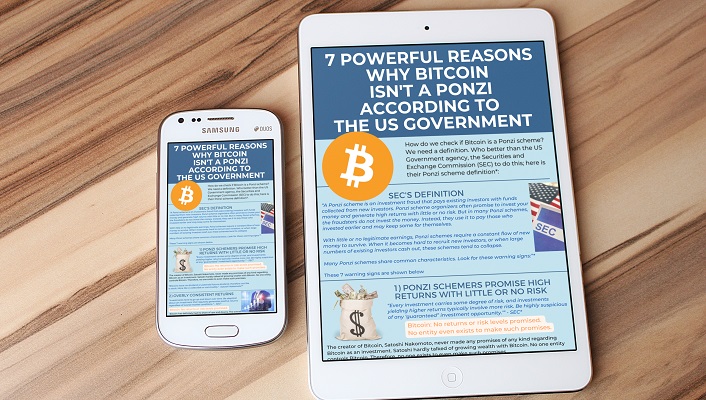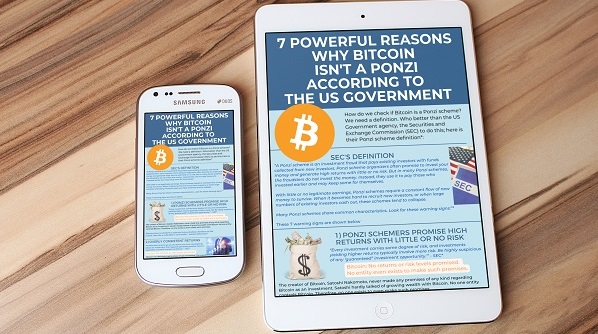7 Powerful Reasons Why Bitcoin Isn’t a Ponzi According to the US Government…

7 Powerful Reasons Why Bitcoin Isn’t a Ponzi According to the US Government
Defining a Ponzi Scheme
How do we check if Bitcoin is a Ponzi scheme? We need a definition. Who better than the US Government agency, the Securities and Exchange Commission (SEC) to do this; here is their Ponzi scheme definition1:
“A Ponzi scheme is an investment fraud that pays existing investors with funds collected from new investors. Ponzi scheme organizers often promise to invest your money and generate high returns with little or no risk. But in many Ponzi schemes, the fraudsters do not invest the money. Instead, they use it to pay those who invested earlier and may keep some for themselves.
With little or no legitimate earnings, Ponzi schemes require a constant flow of new money to survive. When it becomes hard to recruit new investors, or when large numbers of existing investors cash out, these schemes tend to collapse.”
“Many Ponzi schemes share common characteristics. Look for these warning signs:”
We detail these 7 warning signs below quoting from the SEC definition1:
#1) Ponzi Schemers Promise High Returns with little or no risk.“Every investment carries some degree of risk, and investments yielding higher returns typically involve more risk. Be highly suspicious of any ‘guaranteed” investment opportunity.’” – SEC1
Bitcoin: No returns or risk levels promised. No entity even exists to make such promises.
The creator of Bitcoin, Satoshi Nakomoto, never made any promises of any kind regarding Bitcoin as an investment. Satoshi hardly talked of growing wealth with Bitcoin. No one entity controls Bitcoin. Therefore, no one exists to even make such promises.
“Bitcoins have no dividend or potential future dividend, therefore not like a stock. More like a collectible or commodity.” –Satoshi Nakamoto**
#2) Overly consistent returns. “Investments tend to go up and down over time. Be skeptical about an investment that regularly generates positive returns regardless of overall market conditions.” – SEC*
Bitcoin: No returns or risk levels promised.
Bitcoin has definitely had its share of ups and downs. The overall trend is up though. For every down year, Bitcoin has 3 up years. Bitcoin definitely clears this hurdle.
#3) Unregistered investments. “Ponzi schemes typically involve investments that are not registered with the SEC or with state regulators. Registration is important because it provides investors with access to information about the company’s management, products, services, and finances.” – SEC*
Bitcoin: There is no one running Bitcoin. Bitcoin is a commodity per the SEC.
Bitcoin is not something a person or company controls. There is no company or person in charge of Bitcoin that can register with the SEC. It is up to each individual to choose to earn Bitcoin from mining or receive Bitcoin from another Bitcoin user.
Satoshi didn’t even claim it was an investment. Now that Bitcoin is over 15 years old, countries around the world have recognized it. The USA classifies it as a commodity which can’t be a Ponzi scheme.
“Bitcoin is the only one (cryptocurrency) I’m going to say…`They’re a commodity.’” – SEC Chair Gary Gensler on CNBC, June 27, 2023***
For the full story on the last 4 reasons, sign up to my email list to get the full PDF report. You get my insights on Bitcoin on a weekly basis. The form is below. I work to pass along the best Bitcoin nuggets I come across.
Here are the final 4 Ponzi warning signs that don’t apply to Bitcoin. To learn why you have to download the PDF.
#4) Unlicensed sellers.
#5) Secretive, complex strategies.
#6) Issues with paperwork.
#7) Difficulty receiving payments.
Sources:*SEC: https://www.investor.gov/protect-your-investments/fraud/types-fraud/ponzi-scheme;
**Nakomoto Institute https://satoshi.nakamotoinstitute.org/quotes/bitcoin-economics/;
***CNBC: https://www.cnbc.com/video/2022/06/27/sec-chair-gary-gensler-discusses-potential-crypto-regulation-and-stablecoins.html;
